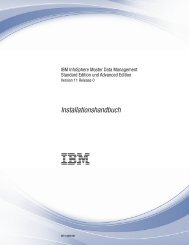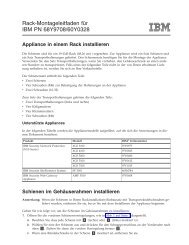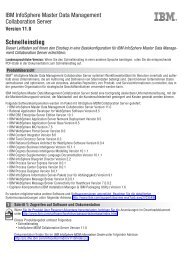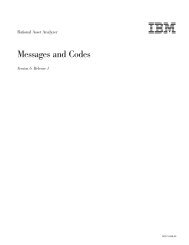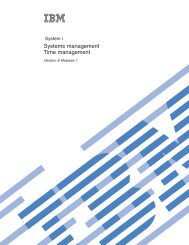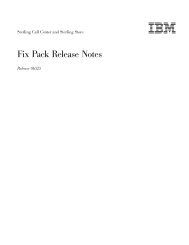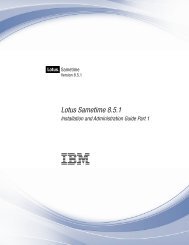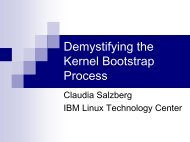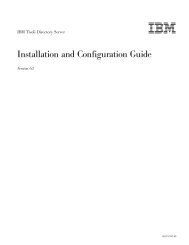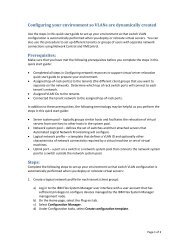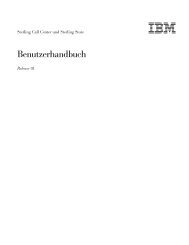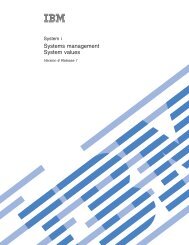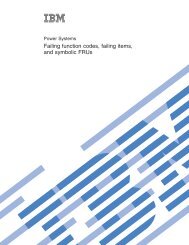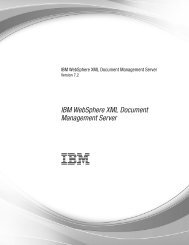System i: Programming Secure Sockets APIs - IBM
System i: Programming Secure Sockets APIs - IBM
System i: Programming Secure Sockets APIs - IBM
Create successful ePaper yourself
Turn your PDF publications into a flip-book with our unique Google optimized e-Paper software.
ufID (Input)<br />
The following values can be used to retrieve information about the secure session or the SSL<br />
environment that is either defaulted or explicitly set:<br />
v GSK_KEYRING_FILE (201) - buffer points to the name of the certificate store file being used<br />
for the SSL environment.<br />
v GSK_KEYRING_PW (202) - buffer points to the password for the certificate store file being<br />
used for the SSL environment.<br />
v GSK_KEYRING_LABEL (203) - buffer points to the certificate label associated with the<br />
certificate in the certificate store identified by GSK_KEYRING_FILE to be used for the secure<br />
session or SSL environment.<br />
v GSK_OS400_APPLICATION_ID (6999) - buffer points to the application identifier being used<br />
for the SSL environment.<br />
v GSK_V2_CIPHER_SPECS (205) - buffer points to the list of available SSL Version 2 ciphers to<br />
be used for the secure session or the SSL environment. See the usage notes in<br />
“gsk_attribute_set_buffer()—Set character information for a secure session or an SSL<br />
environment” on page 16 API for the format of the ciphers.<br />
v GSK_V3_CIPHER_SPECS (206) - buffer points to the list of available SSL Version 3 or TLS<br />
Version 1 ciphers to be used for the secure session or the SSL environment. See the usage notes<br />
in “gsk_attribute_set_buffer()—Set character information for a secure session or an SSL<br />
environment” on page 16 API for the format of the ciphers.<br />
v GSK_CONNECT_SEC_TYPE (208) - buffer points to a string containing ″SSLV2,″ ″SSLV3,″ or<br />
″TLSV1,″ depending on what was actually negotiated for use by the secure session.<br />
v GSK_CONNECT_CIPHER_SPEC (207) - buffer points to a one- or two-character string<br />
describing the cipher specification negotiated for use by the secure session. See the usage notes<br />
in “gsk_attribute_set_buffer()—Set character information for a secure session or an SSL<br />
environment” on page 16 API for the format of the ciphers.<br />
v GSK_SID_VALUE (212) - buffer points to a string containing the session ID (SID) used for the<br />
secure session.<br />
buffer (Output)<br />
The address of the location to place the pointer that will point to the buffer containing the<br />
requested information. The storage for this information was allocated by the system from user<br />
heap storage and will be freed by the gsk_secure_soc_close() API or the<br />
gsk_environment_close() API.<br />
The data in the buffer is assumed to be represented in the CCSID (coded character set identifier)<br />
currently in effect for the job. If the CCSID of the job is 65535, this buffer is assumed to be<br />
represented in the default CCSID of the job.<br />
bufSize (Output)<br />
The address of the location to store the length of the requested information pointed to by buffer.<br />
Authorities<br />
No authorization is required.<br />
Return Value<br />
gsk_attribute_get_buffer()<br />
returns an integer. Possible values are:<br />
[GSK_OK]<br />
gsk_attribute_get_buffer() was successful.<br />
4 <strong>System</strong> i: <strong>Programming</strong> <strong>Secure</strong> <strong>Sockets</strong> <strong>APIs</strong>



